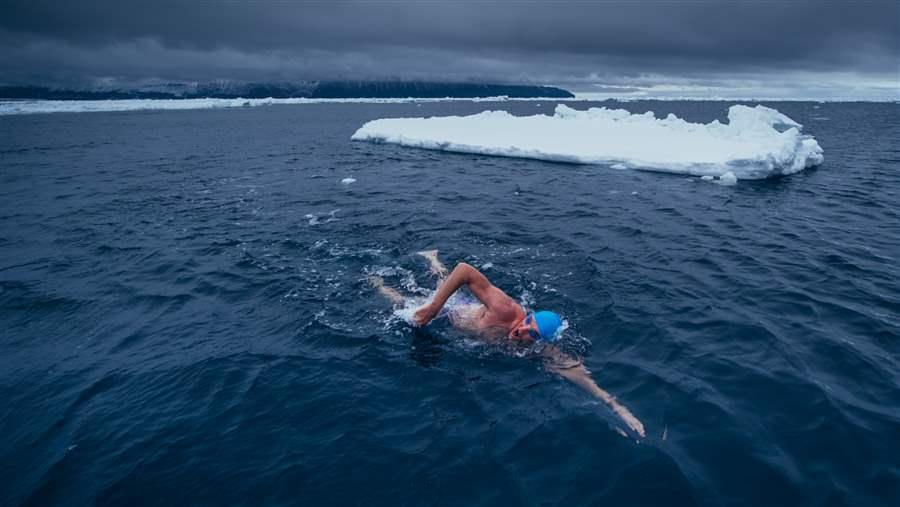Take the #PenguinPlunge
In March, Lewis Pugh, the United Nations Environment Programme Patron of the Oceans, took on a seemingly impossible challenge—swimming the frigid waters of the Bay of Whales in Antarctica’s Ross Sea. Pugh made history by swimming 350 meters (1,150 feet) in the 1 degree Celsius (30 degrees Fahrenheit) waters of the Southern Ocean, breaking the world record for the most southerly swim ever recorded. But more importantly, he reminded people of the plight of the Antarctic region and why it needs protection now.
 © Kelvin Trautman
© Kelvin TrautmanLewis Pugh swimming in the Bay of Whales.
The Commission for the Conservation of Antarctic Marine Living Resources (CCAMLR) is made up of 24 countries and the European Union and is responsible for protecting the fisheries and marine life of the Southern Ocean. In the past three years, members have tried four times to create a marine reserve in the Ross Sea and marine protected areas in the waters of East Antarctica. In October 2014, Russia and China blocked consensus, and without it, any conservation measures remain stymied.
The Southern Ocean is home to more than 9,000 species, including many found nowhere else on Earth. The region is remarkably free from large-scale human activities, such as industrial fishing. However, fisheries do exist, particularly for Antarctic krill, the base of the food web. Overfishing could disrupt the balance of the ecosystem and have dire consequences for species such as Antarctic toothfish, leopard seals, and the six species of penguin found in Antarctic and sub-Antarctic waters.
In the last four years, Pew’s partners at the Antarctic Ocean Alliance have received more than 315,000 public comments from around the world supporting action by CCAMLR to protect the Southern Ocean. Inspired by Pugh’s remarkable cold-water swim this year, the alliance is asking supporters to again take action and get involved in the Penguin Plunge.
The plunge is simple: All you need is a camera, any size body of water, and, if you’re feeling fancy, a bowtie. Just take a photo of yourself and your friends and family jumping into the water and share it with your social media networks using the hashtag #PenguinPlunge or by visiting www.antarcticocean.org/penguinplunge.
Take the #PenguinPlunge
Join Percy the Penguin as he travels around his home in Hobart, Australia, and explains why marine protection is so important.
Pew's global penguin conservation campaign has been working for several years to protect the habitats and ecosystems that these iconic birds and other Southern Ocean marine life depend on for survival. Pugh has focused new attention on protecting these pristine waters. Through the #PenguinPlunge, everyone has an opportunity to make clear to decision-makers the importance of Southern Ocean protections.
Help protect penguins and make a difference at this October’s CCAMLR annual meeting by taking the plunge. The future of the Southern Ocean depends on all of us working together to make sure these waters remain safe and secure for generations to come.
Andrea Kavanagh directs The Pew Charitable Trusts’ global penguin conservation campaign.







